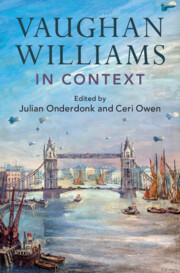Book contents
- Vaughan Williams in Context
- Composers in Context
- Vaughan Williams in Context
- Copyright page
- Dedication
- Contents
- Illustrations
- Graphs and Tables
- Musical Examples
- Notes on Contributors
- Acknowledgements
- Editorial Note
- Bibliographic Abbreviations
- Introduction
- Part I Biography, People, Places
- Part II Inspiration and Expression
- Part III Culture and Society
- Part IV Arts
- Part V Institutions
- Part VI Reception
- Further Reading
- Index of Works
- General Index
Introduction
Published online by Cambridge University Press: 28 March 2024
- Vaughan Williams in Context
- Composers in Context
- Vaughan Williams in Context
- Copyright page
- Dedication
- Contents
- Illustrations
- Graphs and Tables
- Musical Examples
- Notes on Contributors
- Acknowledgements
- Editorial Note
- Bibliographic Abbreviations
- Introduction
- Part I Biography, People, Places
- Part II Inspiration and Expression
- Part III Culture and Society
- Part IV Arts
- Part V Institutions
- Part VI Reception
- Further Reading
- Index of Works
- General Index
Summary
To explore Vaughan Williams in context is a peculiarly appropriate project for a figure who famously declared: ‘The composer must not shut himself up and think about art, he must live with his fellows and make his art an expression of the whole life of the community’. Indeed, this quotation will be encountered frequently throughout this book. Across a career that stretched from the 1890s to the late 1950s, Vaughan Williams produced a huge and varied body of music; he also worked to promote and more deeply embed music within social and cultural life in England and Britain more broadly, achieving this through his compositions for amateur as well as professional musicians, and through his related work as a folk-song collector and arranger, hymn editor, writer, lecturer, radio broadcaster, administrator, conductor, and musical-, educational-, and social activist. By the interwar years Vaughan Williams was regarded as the most important English composer of his time, and, by the end of the Second World War, he had become a national if not an international celebrity.
- Type
- Chapter
- Information
- Vaughan Williams in Context , pp. 1 - 8Publisher: Cambridge University PressPrint publication year: 2024

